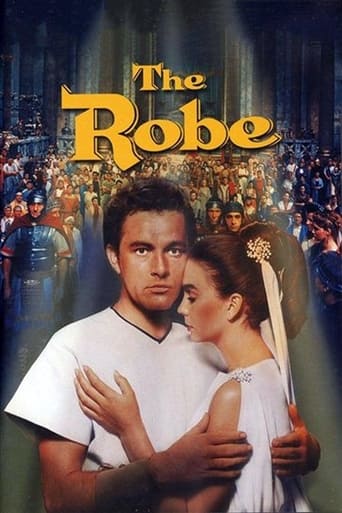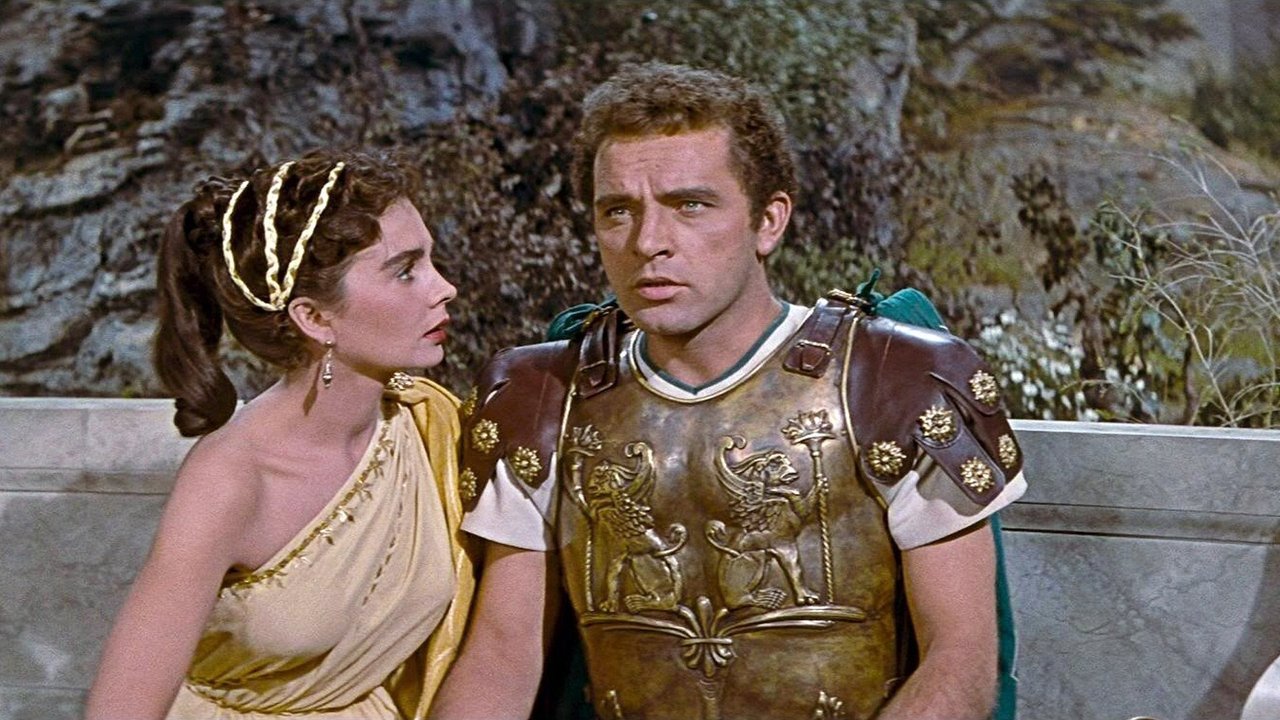pp312
Is it me, or is this movie boring? I'm into historical epics--my all time favourites are Ben-Hur and Spartacus--and I was looking forward to the Robe based on its reputation but...nothing happened. Nothing happened for an hour, then there was a somewhat perfunctory one-on-one sword-fight, hardly exciting, and then not much happened for another hour. There was certainly no action of any consequence. I know this may sound superficial (and no, I'm not some short-attention-span teenager), but I do expect a few action set pieces in an historical epic and this film just didn't have them. (Oddly, the sequel, Demetrius & the Gladiators, did, and was much more entertaining for it). If it hadn't been for Jay Robinson joyously chewing the scenery like scenery has never been chewed before, and Alfred Newman's soaring music, the film would have been unbearable; as it was I found myself thinking of other things for much of its running time and only coming back when the music roused me. I kind of cringe now when I see it listed with the big-boy epics of the 50s because it just doesn't belong there; whatever one may think of the script or acting it's not an epic. It's like a musical with the musical numbers removed.More action, guys. Keep the sensitive stuff. Keep the elevated stuff. Keep the literate stuff. But more action.
MartinHafer
When the filmmakers were making "The Robe", they knew that they'd also be making the sequel "Demetrius and the Gladiators" and filmed them one after the other with no stoppage in between. Now you'd expect that as usual, the first film would be much better than the next, but this is an odd case where this is NOT so. While I really liked "Demetrius and the Gladiators" when I saw it recently, I was very disappointed by "The Robe". And, yes, I watched the films in reverse order! The film is set near the time of Jesus' death and is told from the point of view of a Roman official, Marcellus Gallio (Richard Burton). He and his slave, Demetrius (Victor Mature) are sent to Judea and his is there at the crucifixion. In fact, as the Roman soldiers are casting dice for Jesus' clothes, Marcellus wins the robe. However, little does he know that this robe seems to have magical properties (huh?!) and through this robe, Marcellus comes to become a Christian--making it among the strangest conversion experiences in Hollywood history. However, the insane Emperor, Caligula (Jay Robinson) is not at all pleased, as he hates Christians and takes great sport in killing them. What's to become of Marcellus and his sweetie, Diana (Jean Simmons) once their conversions come to the attention of the nutty 'ol Emperor? Of all of Richard Burton's films, according to IMDb he was least proud of this one because of his wooden performance. While I would agree that it was generally wooden, when it wasn't so flat it was hilariously over-acted. I particularly laughed when Marcellus went mad--and Burton did it in a way highly reminiscent of William Shatner in "Impulse"--and this is NOT meant as a compliment for either of them.Overall, I'd say that the film is, at best, a time-passer. It has lovely sets and nice costumes but it also features some bad acting and a dubious message about Christianity. My advice is so see the sequel--it's something "The Robe" isn't--entertaining. A little bit more subtlety sure would have helped this film, as would an infusion of life and fun. As a result, the film just drags and drags to its conclusion.
jeffhaller125
Without Victor Mature and Jean Simmons this movie would be a zero. These actors had the talent to give some nobility and seriousness to the nonsense. The dialog is dreadful and the whole thing looks so cheap. But what is really awful is that it moves so slowly. Some of the score is quite touching, it does the work that the director and screenplay can't. It is hard to understand in the 21st century what could have made audiences then flock to it. It had to be the Cinemascope. That isn't to say that this century hasn't offered its own bores. Biblical movies don't seem to hold the public's interest as they once did. And in spite of my not liking this movie, I think that it could be remade today if a director could pick up the pace. There is some potentially touching stuff but 1950s America was such an unimaginative time and place for movie-making that this one didn't have a chance to be well remembered.
sddavis63
I've been familiar with "The Robe" and its basic outline for many years but have never actually seen it until now. It stands in the tradition of the historical/religious epic (think "The Ten Commandments" or "The Greatest Story Ever Told") but it approaches it subject matter from a different perspective. Rather than viewing the events from the perspective of the "religious" figure (Moses or Jesus) this movie looks at the early development and impact of the Christian faith through the eyes of the Roman tribune Marcellus Gallio (played by Richard Burton) who is assigned to and arrives in Jerusalem apparently on Palm Sunday as Jesus (who is never really seen) arrives in the city hailed as the Messiah and who was then depicted as being in command of Christ's crucifixion and who watched as Jesus spoke his famous words from the cross: "Father, forgive them, for they know not what they do." Haunted by the memory and impacted in a mysterious way by Christ's crimson robe which he gains possession of as the soldiers draw lots to divide Christ's clothing among themselves, Gallio begins a journey of self- discovery and spiritual discovery as he first searches for his slave Demetrius (Victor Mature) who had left him to follow Jesus and as he then is welcomed into the Christian community which Demetrius has joined and as he learns about this new faith from no less a figure than Simon Peter (Michael Rennie) himself.The gradual transformation of Gallio as well as the very early growth of the Christian community (first in Palestine and then throughout the Empire, including in Rome itself) was well depicted as was the fear felt by the Roman Emperor Caligula (Jay Robinson) as he is confronted by this new faith which he sees as a threat to himself and the Empire. I have no hesitation in saying that the transformative effect of Christianity (both on individuals and on society as a whole) was very well portrayed. Having said that, the movie as a whole didn't draw me to it the way Christ drew Gallio to Himself.From the perspective of historical/religious epics this has more in common with "The Greatest Story Ever Told" than with "The Ten Commandments." The latter movie was an opulent and visually stunning film that drew the viewer in simply by its grandeur. The former presented a more spiritual story - but in all honesty spirituality works better as an inner resource and experience than as the subject matter for a 2 hour plus movie. As well portrayed as the account of spiritual transformation is, the movie lacks any truly spell-binding moments and I thought it seemed much longer than its two and a quarter hour run time. Perhaps realizing that, director Henry Koster manages to inject bit of traditional "movie-making excitement" with a few well choreographed sword fights, but in some ways even these seemed out of place - why would these early Christians (followers of Jesus who rejected the idea of his followers saving him by the sword) turn to the sword to save Demetrius? That seemed inconsistent, although it made for a good rescue scene! Gallio's trial before Caligula was well done, with Caligula appropriately and correctly portrayed as a man who was at best on the edge of sanity.This certainly isn't a bad movie. It has lots of good performances and it's an interesting bit of speculation about the early spread of the Christian faith throughout the Roman Empire. Still, as sheer entertainment it's somewhat lacking and as a result perhaps loses some of the impact that it should be expected to have. (5/10)



 AD
AD





